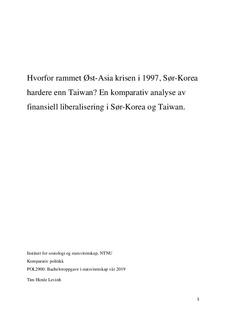| dc.contributor.advisor | Wishman, Marius | |
| dc.contributor.author | Levinh, Tim | |
| dc.date.accessioned | 2019-09-06T14:11:41Z | |
| dc.date.available | 2019-09-06T14:11:41Z | |
| dc.date.issued | 2019 | |
| dc.identifier.uri | http://hdl.handle.net/11250/2613592 | |
| dc.description.abstract | Den økonomiske krisen som fant sted i Øst-Asia i 1997, har lenge blitt diskutert blant økonomer. Selv flere år etter krisen, er det ikke oppnådd noe konsensus om rollen finansiell liberalisering hadde, i å forårsake krisen. Hovedsakelig kan forskning rundt krisen kategoriseres i to leire. En leir har pekt på finansiell liberalisering som grunnen til at øst-asiaterne opplevde en av århundrets verste økonomiske kriser. Andre forskere har antydet at mangel på finansiell liberalisering var årsaken til krisen. I denne avhandlingen vil finansiell liberalisering i Sør-Korea og Taiwan sammenlignes. Problemstillingen til avhandlingen blir: Hvorfor rammet Øst-Asia krisen Sør-Korea hardere enn Taiwan? Avhandlingen vil vise at mye av tidligere forskning har tolket finansiell liberalisering feil. Det kommer fram at det er ulike måter å implementere finansiell liberalisering på. Spesielt kan rask liberalisering lik den i Sør-Korea, øke risikoen for å bli usatt for økonomiske kriser. Rask liberalisering kan gi ugunstig utvikling som kan gi opphav til finans og valutakriser. Sammen kan slike kriser videre resulterte i økonomiske nedgangstider. | |
| dc.description.abstract | The economic crisis that took place in East Asia in 1997 has long been discussed among economists. Even several years after the crisis, no consensus has been reached on the role financial liberalization had in causing the crisis. Primarily research on the crisis can be categorized into two groups. One group has claimed that financial liberalization was the reason to why the East Asians experienced one of the worst economic crises of the century. Other researchers have suggested that lack of financial liberalization caused the crisis. In this paper financial liberalization in South Korea and Taiwan will be compared. This paper will answer why the East Asia crisis in 1997, hit South Korea harder than Taiwan. This paper will show that much previous research has misinterpreted financial liberalization as a phenomenon. It appears that there are various ways to implement financial liberalization. Especially rapid financial liberalization like in South Korea, increases the risk of being hit by an economic crisis. Rapid liberalization can lead to unfavourable development where financial and currency crisis occur. Together such crisis can lead to economic downturns. | |
| dc.language | nob | |
| dc.publisher | NTNU | |
| dc.title | Hvorfor rammet Øst-Asia krisen i 1997, Sør-Korea hardere enn Taiwan? En komparativ analyse av finansiell liberalisering i Sør-Korea og Taiwan. | |
| dc.type | Bachelor thesis | |
